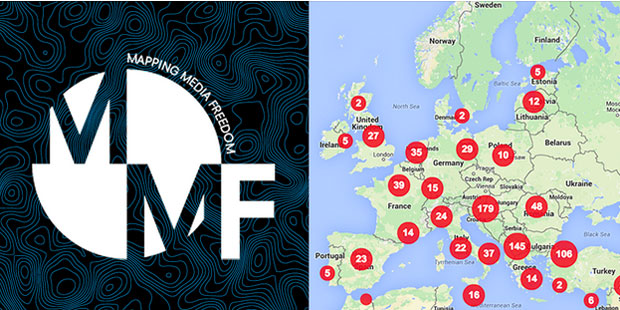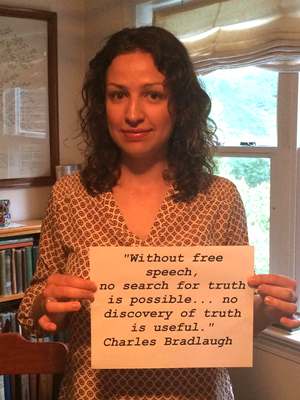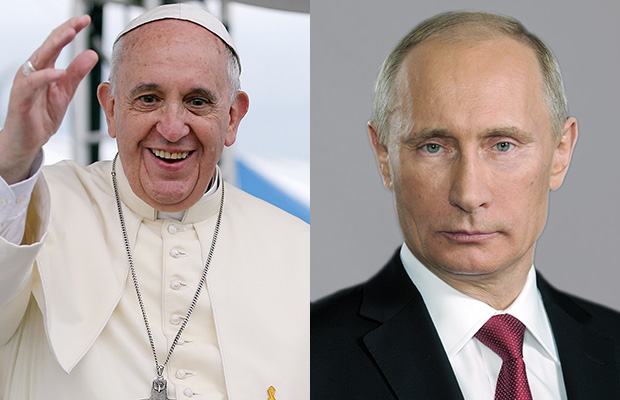11 Sep 2015 | Campaigns, Mapping Media Freedom, mobile, Press Releases

Index on Censorship, the European Federation of Journalists and Reporters Without Borders are delighted to announce the expansion and redesign of Mapping Media Freedom, which records threats to journalists across Europe, and which will now also cover Russia, Ukraine and Belarus.
First launched in May 2014, the map documents media freedom violations throughout the European Union and neighbouring countries including the Balkans and Turkey.
More than 700 reports were logged on the map in its first year, lifting the lid on the everyday threats to media freedom that have previously gone largely unreported or undocumented.
“Mapping Media Freedom has highlighted the kinds of threats faced by media organisations and their staff everyday throughout Europe — from low-level intimidation to threats of violence, imprisonment, and even murder. Having a detailed database of these incidents – most of which previously went unreported — helps us and others to take action against the culprits,” said Index on Censorship CEO Jodie Ginsberg.
The relaunched online platform will make it easier for policy makers and activists to identify trends in media freedom and to respond efficiently with immediate assistance or to campaign on specific issues. It also provides support such as legal advice and digital security training to journalists at risk. Anyone can submit their own reports to the site for verification by project officers.
“At a time when freedom of information is facing threats not seen since the times of the Soviet Union, supporting journalists and bloggers is crucial. While part of the continent is sinking in an authoritarian drift, online surveillance has become a common challenge”, said RSF Programme Director Lucie Morillon.
Following renewed funding from the European Commission earlier this year, the crowd-sourced map incorporates new features including country filters and an improved search facility. The project also aims to forge new alliances among journalists across the continent, especially young media practitioners who will find useful resources and in depth coverage on a dedicated “Free Our Media!” page.
In reaction to new draconian measures and violence in the region, the new design coincides with an expansion into Russia, Ukraine and Belarus. All new reports from this area will be available in English and the regional language.
“The enlargement of the monitoring process to Ukraine, Russia and Belarus is good news for journalists and media workers in the region. Journalists are usually at the heart of violent demonstrations, clashes and armed conflicts where they may be shot, assaulted, kidnapped, arrested, abused and killed. They are facing difficult professional challenges between extremists or propaganda agents. Thanks to its affiliates, the EFJ will continue to document all media violations and raise awareness to end impunity when violations occur”, said Mogens Blicher Bjerregård, EFJ President.
Partners, country correspondents and affiliates to the project — including Human Rights House Ukraine, Media Legal Defence Initiative and European Youth Press — will work together to ensure the growing threats to media freedom in the region are highlighted, and tackled.
For further information please contact Hannah Machlin, project officer,[email protected], +44 (0)207 260 2671
Mapping Media Freedom
Click on the bubbles to view reports or double-click to zoom in on specific regions. The full site can be accessed at https://mappingmediafreedom.org/
|
20 Aug 2015 | mobile, News, Russia, Youth Board
This is the eighth of a series of posts written by members of Index on Censorship’s youth advisory board.
Members of the board were asked to write a blog discussing one free speech issue in their country. The resulting posts exhibit a range of challenges to freedom of expression globally, from UK crackdowns on speakers in universities, to Indian criminal defamation law, to the South African Film Board’s newly published guidelines.

Anastasia Vladimirova is a member of the Index youth advisory board. Learn more
On July 29, Russia’s independent media support fund, Sreda, announced it would be liquidated due to lack of funding.
Russia’s Ministry of Justice declared the fund a “foreign agent” after its mandatory check into the organisation’s finances.
Direct interference by the Russian government became possible in 2012 after President Vladimir Putin approved a law requiring all non-governmental organisations that receive foreign funding and engage in vaguely defined political activity to register as foreign agents with the Russian Ministry of Justice.
Since its inception, however, Sreda had received money from Dmitry Zimin, a Russian entrepreneur and investor in science and education, whose nonprofit foundation Dynasty closed earlier this year due to the scrutiny imposed by the Ministry of Justice under the same law. Given the absence of foreign funding, the liquidation of Sreda is an example of Russia’s ruthless crackdown on independent media masquerading as a legal fight against the alleged foreign influence on Russia’s political and civic life.
Colta, Novaya Gazeta and TV Rain Channel are just a few examples of Sreda’s now former grantees that struggle to keep up their independent voices in the media landscape dominated by state-sponsored outlets.
Anastasia Vladimirova, Russia
Related:
• Simeon Gready: An over-the-top regulation policy
• Ravian Ruys: Without trust, free speech suffers
• Muira McCammon: GiTMO’s linguistic isolation
• Jade Jackman: An act against knowledge and thought
• Harsh Ghildiyal: Defamation is not a crime
• Tom Carter: No-platforming Nigel
• Matthew Brown: Spying on NGOs a step too far
• About the Index on Censorship youth advisory board
• Facebook discussion: no-platforming of speakers at universities
9 Jul 2015 | Campaigns, mobile, Statements
“Impunity is a great threat to press freedom in Russia,” said Melody Patry, Index on Censorship’s Senior Advocacy Officer. “Failing to use appropriate measures to investigate the murder of Akhmednabi Akhmednabiyev is not only a denial of justice, it sends the tacit message that you can get away with killing journalists. When perpetrators are not held to account, it encourages further violence towards media professionals.”
Statement
On the 2nd anniversary of the murder of independent Russian journalist, Akhmednabi Akhmednabiyev, we, the undersigned organisations, call for the investigation into his case to be urgently raised to the federal level.
Akhmednabiyev, deputy editor of independent newspaper Novoye Delo, and a reporter for online news portal Caucasian Knot, was shot dead on 9 July 2013 as he left for work in Makhachkala, Dagestan. He had actively reported on human rights violations against Muslims by the police and Russian army.
Two years after his killing, neither the perpetrators nor instigators have been brought to justice. The investigation, led by the local Dagestani Investigative Committee, has been repeatedly suspended for long periods over the last year and half, with little apparent progress being made.
Prior to his murder, Akhmednabiyev was subject to numerous death threats including an assassination attempt in January 2013, the circumstances of which mirrored his eventual murder. Dagestani police wrongly logged the assassination attempt as property damage, and only reclassified it after the journalist’s death, demonstrating a shameful failure to investigate the motive behind the attack and prevent further attacks, despite a request from Akhmednabiyev for protection.
Russia’s failure to address these threats is a breach of the state’s “positive obligation” to protect an individual’s freedom of expression against attacks, as defined by European Court of Human Rights case law (Dink v. Turkey). Furthermore, at a United Nations Human Rights Council (HRC) session in September 2014, member States, including Russia, adopted a resolution (A/HRC/27/L.7) on safety of journalists and ending impunity. States are now required to take a number of measures aimed at ending impunity for violence against journalists, including “ensuring impartial, speedy, thorough, independent and effective investigations, which seek to bring to justice the masterminds behind attacks”.
Russia must act on its human rights commitments and address the lack of progress in Akhmednabiyev’s case by removing it from the hands of local investigators, and prioritising it at a federal level. More needs to be done in order to ensure impartial, independent and effective investigation.
On 2 November 2014, 31 non-governmental organisations from Russia, across Europe as well as international, wrote to Aleksandr Bastrykin calling upon him as the Head of the Investigative Committee of the Russian Federation, to raise Akhmednabiyev’s case from the regional level to the federal level, in order to ensure an impartial, independent and effective investigation. Specifically, the letter requested that he appoint the Office for the investigation of particularly important cases involving crimes against persons and public safety, under the Central Investigative Department of the Russian Federation’s Investigative Committee to continue the investigation.
To date, there has been no official response to this appeal. The Federal Investigative Committee’s public inactivity on this case contradicts a promise made by President Putin in October 2014, to draw investigators’ attention to the cases of murdered journalists in Dagestan.
As well as ensuring impunity for his murder, such inaction sets a terrible precedent for future investigations into attacks on journalists in Russia, and poses a serious threat to freedom of expression.
We urge the Federal Investigation Committee to remedy this situation by expediting Akhmednabiyev’s case to the Federal level as a matter of urgency. This would demonstrate a clear willingness, by the Russian authorities, to investigate this crime in a thorough, impartial and effective manner.
Supported by
ARTICLE 19
Albanian Media Institute
Analytical Center for Interethnic Cooperation and Consultations (Georgia)
Association of Independent Electronic Media (Serbia)
The Barys Zvozskau Belarusian Human Rights House
Belorussian Helsinki Committee
Center for Civil Liberties (Ukraine)
Civil Society and Freedom of Speech Initiative Center for the Caucasus
Crude Accountability
Helsinki Citizens’ Assembly – Vanadzor (Armenia)
Helsinki Committee of Armenia
Helsinki Committee for Human Rights in Serbia
Helsinki Foundation for Human Rights
The Human Rights Center of Azerbaijan
Human Rights House Foundation
Human Rights Monitoring Institute
Human Rights Movement “Bir Duino-Kyrgyzstan”
Index on Censorship
International Partnership for Human Rights
International Press Institute
Kharkiv Regional Foundation -Public Alternative (Ukraine)
Kazakhstan International Bureau for Human Rights and Rule of Law
Moscow Helsinki Group
Norwegian Helsinki Committee
PEN International
Promo LEX Moldova
Public Verdict (Russia)
Reporters without Borders
Заявление по-русски
11 Jun 2015 | Europe and Central Asia, mobile, News, Russia

Pope Francis met with Russian President Vladimir Putin (Photos: Pope Francis: Korean Culture and Information Service/Wikimedia Commons; Vladimir Putin: Kremlin.ru/Wikimedia Commons)
What might have happened when the leader of the world’s largest state met the leader of the world’s smallest?
Francis: Welcome to the Vatican, Vladimir. I hope you are not put off by my incredibly humble surroundings, here in my own humble city state. I am very humble, you know.
Vladimir: Yes, so your aides reminded me, several times. It is very important for men as important as ourselves to stay humble, I believe. We would not want to, as they say, “lose the run of ourselves”. Tell me, dear humble priest: I hear you are a communist now?
Francis (laughing, filled with divine light and humility): Haha! Not quite, comrade. The only redistribution I’m interested in is the redistribution of Christ’s love. The only means of production I want to seize control of are the means of production of compassion in men’s hearts. The only permanent revol…
Vlad: Right, yes, I think I get it. So, the whole “praying for the conversion of Russia” thing: that’s not a thing any more?
Frank: Oh that? Lord no. Thing of the past. If anything, we’re praying for the rest of the world to be more like Russia. Look at the rest of the world: secular, godless, decadent, lacking a certain…what’s the word I’m looking for?
Vlad: Humility?
Frank: Yeah, that’s the one. Lacking humility. But Russia. In Russia, the church is still number one. Admittedly, the wrong church, but, well, who am I to be picky?
Vlad: Good to know. So, where did the communist thing come from?
Frank: Ah, the Americans. You know how they are.
Vlad: I see. So you have been defamed by the Yanqui too? I have had my trouble with them. They even claimed I invaded Ukraine. HAHAHA!
Frank (nervously, humbly): HAHAHAHAHAH (hmm). Daft, of course. I mean, you didn’t, did you?
Vlad: Of course not! Why would I do that?
Frank: Well, they might have insulted your mother. In which case you’d have every right, as I outlined in my pamphlet: “Ego In Gutture Ferrum, Punk”
Vlad: Um, right.
Frank: It’s totally theologically sound. As Jesus himself said: “I tell you, do not resist an evil person. If anyone slaps you on the right cheek, punch them in the throat.”
Vlad (under breath): Catholics are weird
Frank: You talking about my mother?
Vlad: No! No! Lord no. Holy Father, if I may call you that…
Frank: I humbly accept the title
Vlad: Holy Father, it is true, as you said, that if someone insults someone’s mother, they should expect a punch?
Fran: It’s not just me saying that. Jesus says it!
Vlad: I’m almost certain he doesn’t, but hey, you’re the Pope.
Frank: I am, you know.
Vlad: Anyway, what does one do when someone, say, doesn’t insult your mother, but insults you, and you can’t punch them in the throat because they’re women and apparently you’re not supposed to do that anymore?
Frank: Not following.
Vlad: That, group: those awful people whose name I can’t really say in front of a priest.
Frank: Ah! The Pussy Riots band!
Vlad: Well, I was thinking “the feminists”, but yes, them. Was it OK to send them to the Gulag?
Frank: I’m not really sure I’m in a position to comment here. The organisation of which I humbly find myself head doesn’t have…we don’t have a great track record on the whole locking-up-unruly-girls thing.
Vlad: Oh yes, that. You’ve stopped doing that, right?
Frank: Pretty much. How about you? Your lot were pretty keen on the whole packing-em-off thing.
Vlad: Ha, yes. I’ll square with you, Frank. Can I call you Frank?
Frank: No.
Vlad: Ah. Ok. Awks. Er, I’ll square with you, Holy Father: the gulag thing’s a hard habit to break. You know, you’ve got the rigged courts, the fantasy charges… but most of all, I mean…it’s heritage, isn’t it? Tradition.
Frank: Tradition!
Vlad: Tradition, you know…(sings) “Il Papa. Il Papa, Tradition!”
Frank: Stop that.
Vlad: Sorry, can’t help myself. Love that show.
Frank: Yes, we all do. But, y’know, not here. Vatican and all that. Don’t have a great record on those people either.
Vlad. Who? Musical theatre people?
Frank: Well, I was going to say the…but yes, the musical theatre people.
Vlad: We too have our trouble with the musical theatre people. Must they be so theatrical? In front of the children? I mean, what if everyone was theatrical? What then? Everyone would be putting the show on right here and no one would be making babies.
Frank: So true.
Vlad: I mean, it’s not like I’m obsessed or anything. I’m not that bothered by them, honest. Hell, I’ve even been to a few musicals.
Frank: Let he among us who hasn’t been touched by musical theatre throw the first punch.
Vlad: Um, right.
Frank: Ha! I see even you are a bit put out by the constant talk of punching. But I was a bouncer in Buenos Aires. And you know what we say in Argentina? “You can’t spell ‘Bad Boy’ without BA!” Ha!
Vlad: Good one. Back in Leningrad we used to say “You can’t spell ‘Please! Stop! I’ll confess to anything!’ without ‘KGB’”
Frank: ?
Vlad: It works in Russian. Different alphabet.
Frank: Of course.
Vlad: Anyway, where was I? Yes, the musical theatre people. I mean, all very well in it’s place…
Frank: New York?
Vlad: EXACTLY. But why bring it to Russia?
Frank: Exactly. Sometimes its like they think they should have their own stage in their own building in every parish in the world where they can get all dressed up and put on their strange little performances, and we’re all supposed to worship them for it. Such arrogance, a humble man such as I cannot countenance.
Vlad: Quite.
Frank: I’m glad we can agree on so much. Tell me, you seem like a good, God-fearing, throat-punching man…
Vlad: Why thank you
Frank: Why is it you get such bad press?
Vlad: Well, I’ve got a plan to deal with that.
Frank: Really? Me too. I noticed the guy before me came across as a bit austere, so I decided to say all the same things he said, but in a much more liberal-sounding way. The media loves it. So, what’s your plan for dealing with journalists?
Vlad: Kill them.
Frank: Oh! Ah well, suffer little children to come unto me, as the Lord said.
Vlad: I’m pretty sure that doesn’t mean what you think it means.
Frank: Vlad, you’re a pal, but who’s the one with a direct line to God here?
Vlad: Good question, comrade. Good question.
(Lunch is served).
This column was posted on 12 June 2015 at indexoncensorship.org



